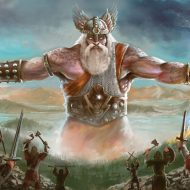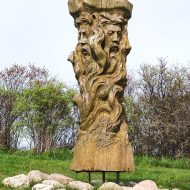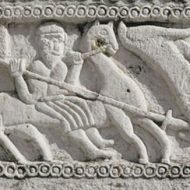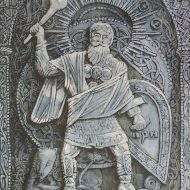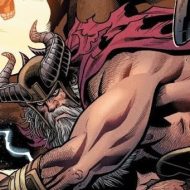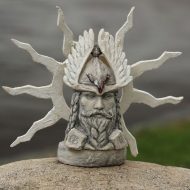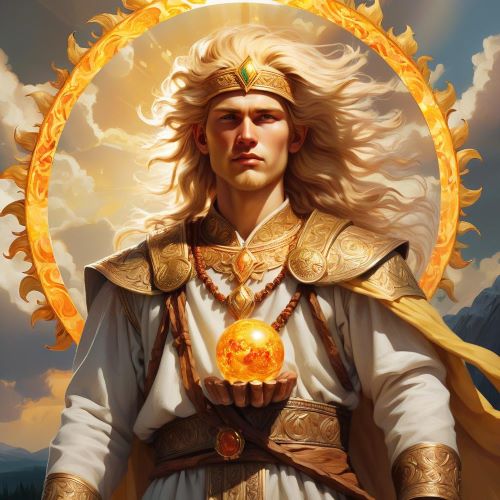Perun : The Thunder God
Listen
Perun
Introduction
Perun, the god of the ancient Slavs, is regarded as a fructifier, a purifier, and an overseer of right and order. He is perceived by the senses through various actions such as the sound of stones, the bleat of a he-goat, and the touch of an ax. In the language of the ancients, the word for Thursday was perundan, and in Slovak and Polish, it is translated to as “thunder.”
In The Russian Primary Chronicle, Perun is mentioned as one of the gods of St. Vladimir, and his name is the first in a list of notable gods. Prone was a popular deity worshipped in oak groves by western Slavs and according to Helmold’s Chronica Slavorum, he was called Prone by the western Slavs. In the 13th century, historian Grammaticus noted that Perun’s son, Porenut, was also a popular deity.
During the Christian period, the worship of Perun was transferred to St. Elijah, but in folk beliefs, his various functions, such as purification and fructification, are still performed by his vehicles the ax, the bull, the he-goat, the dove, and the cuckoo.
Perun is regarded as the most significant god of Slavic and Balkan mythology. He is known to have various attributes, such as sky, thunder, lightning, rain, war, fertility, oak trees, and mountains. He was associated with various types of weapons, such as horses and carts, hammers, and an axe, and arrows.
Physical Traits
Perun is depicted as a red haired, muscular and bearded warrior who rides a burning chariot. His horses, who were also known to breathe fire, were known to make sounds similar to thunder.
Family
Perun’s family was quite extensive. His wife was the Great Mother, who was also goddess of the Sun Mokosh. His mother was Lada, who was the goddess of love, joy and fertility and his children were known as Morana, Jarvlo, Dziewanna, and Marzanna. Dziewanna was the goddess of hunting and wilderness, while Morana was the goddess of death and winter and Jarvlo was the god of spring and agriculture.
Other Names
Perun is closely related to Perkunas and Perkons from Baltic mythology. It is believed that one of the cultures that borrowed the deity from the other and is the Proto-Indo European thunder god. The root of the word “perkwu” originally meant oak, but it has since evolved into “to strike, to kill.”
Powers and Abilities
Perun was regarded as the god of war and the second function of physical and military power. He was known to have various weapons, such as a powerful lightning bolt and stone arrows. According to folk beliefs, some of the remains of these weapons, such as belemnites and fulgurites, have been found underground during excavations.
Several Slavic countries refer to various deposits as “Perun’s stones,” “thunderbolt stones,” “thunderbolt wedges,” and “Perun’s arrow.” Other names for these include “God’s finger,” “devil’s finger,” and “Mother of God finger.” These are also sometimes referred to as “Perkun’s finger” in Lithuania. It is believed that these thunderbolt stones were dislodged from the earth by the wind and eventually returned to the sky.
In addition to his usual weapons, Perun also possessed a new type of weapon that was unusual: the golden apple. In Slavic folk tales, the golden apple is regarded as a symbol of ultimate destruction and although this weapon may not seem like much of a threat, it has been interpreted as a symbol of ultimate destruction in many accounts.
Modern Day Influence
During the Christianization of the region, a religious phenomenon known as “dvoverje” occurred, where people were able to have two faiths at the same time. Although they didn’t want to abandon their Gods, Christians discovered that days of celebrating their Gods were close to those of Christian Saints. To celebrate their Gods, people would exchange Perun for St. Elijah, who was also known as The Thunderer and caused burning and thunderbolts to fall from the sky.
Related Images
Frequently Asked Questions
What is lorem Ipsum?
I am text block. Click edit button to change this text. Lorem ipsum dolor sit amet, consectetur adipiscing elit. Ut elit tellus, luctus nec ullamcorper mattis, pulvinar dapibus leo.
What is lorem Ipsum?
I am text block. Click edit button to change this text. Lorem ipsum dolor sit amet, consectetur adipiscing elit. Ut elit tellus, luctus nec ullamcorper mattis, pulvinar dapibus leo.
What is lorem Ipsum?
I am text block. Click edit button to change this text. Lorem ipsum dolor sit amet, consectetur adipiscing elit. Ut elit tellus, luctus nec ullamcorper mattis, pulvinar dapibus leo.
What is lorem Ipsum?
I am text block. Click edit button to change this text. Lorem ipsum dolor sit amet, consectetur adipiscing elit. Ut elit tellus, luctus nec ullamcorper mattis, pulvinar dapibus leo.
What is lorem Ipsum?
I am text block. Click edit button to change this text. Lorem ipsum dolor sit amet, consectetur adipiscing elit. Ut elit tellus, luctus nec ullamcorper mattis, pulvinar dapibus leo.

